The “American family” in crisis: Colonialism, COVID-19 risk, and climate vulnerability
The fight for racial justice must include a reckoning with US imperialism.
The recent spotlight on anti-Black violence has awoken many white Americans to an uncomfortable truth: that underneath its rhetoric of equality, the United States is a fundamentally racist country. The disproportionate impact of COVID-19 on U.S. communities of color underscores this fact. The pandemic also reveals a lesser known but equally uncomfortable truth: that underneath its rhetoric of liberty and justice for all, the U.S. is not only a racist country, but a racist empire.
U.S. imperialism has rendered oppressed peoples exceptionally vulnerable to COVID-19. Among the hardest hit are Marshallese immigrants, who have come to the states in large numbers after the U.S. occupied their homeland and used their islands and bodies to test nuclear weapons.
Though the U.S. calls the Marshall Islands a member of the “American family,” our policies have foisted heavy disease burdens upon the Marshallese, stripped them of access to healthcare, and left them to die at wildly disproportionate rates during the current pandemic. Many Marshallese now live in Northwest Arkansas where, though they make up just 3% of the population, they account for 50% of COVID-19 deaths.
U.S. Colonial Rule in the Marshall Islands
Spanning over one million square miles in the North Pacific, the Marshall Islands has been home to the Marshallese people for roughly two thousand years. In the nineteenth century, the islands fell under colonial dominion, passing from Spanish to German to Japanese control. The U.S. military seized the islands from Japan at the close of World War II and established naval rule. Soon after, the U.S. became official colonial administrator through the newly minted United Nations. As administering authority, the U.S. accepted “as a sacred trust” obligations to protect the health and welfare of territorial inhabitants, to ensure their “just treatment” and “protection against abuses,” and to promote their self-determination.
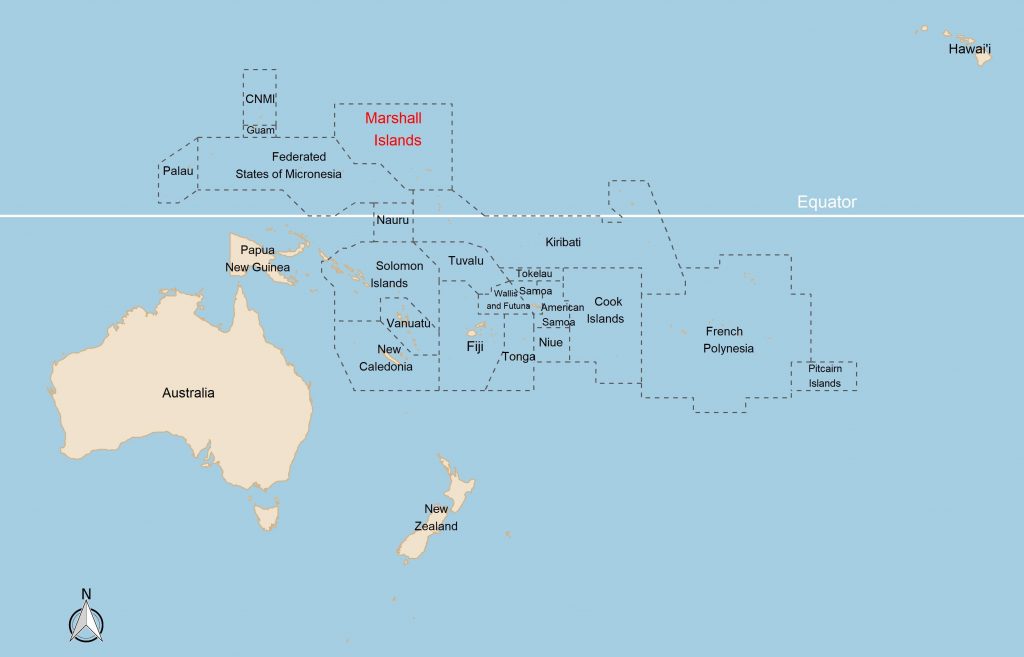
The U.S. blatantly disregarded these sacred duties. Far from protecting health and welfare, the U.S. immediately began using the Marshall Islands to test nuclear weapons, selecting Bikini Atoll and Enewetak Atoll as ground zero. The peoples of Bikini and Enewetak were forced to abandon their homelands “for the good of mankind.”
From 1946 to 1958, the United States detonated 67 nuclear weapons in Bikini and Enewetak—roughly equivalent to 1.2 Hiroshima-sized bombs being dropped every day for twelve years. Many other atolls were contaminated by radioactive fallout, causing a wave of forced migrations and severe health problems—including thyroid disease, birth defects, and cancers—that continue to plague the Marshallese today. Despite promising to remediate the islands and “take care” of displaced peoples, the U.S. has never done so, nor has it adequately compensated the Marshallese for harms caused by nuclear testing.

Instead, islanders were relocated to dense urban population centers where their ways of life were disrupted by a sedentary, confined existence, and their diets were replaced by highly processed, imported food. These poor living conditions brought previously unknown illnesses to the islands, including diabetes and tuberculosis. Today, Marshallese (along with other peoples colonized by the US) suffer among the highest global burdens of these ailments.
U.S. colonial rule in the Marshall Islands was justified by the false narrative that “primitive” island peoples needed American tutelage to achieve civilization. Behind this façade of paternalistic beneficence, however, the same racialized notions justified sacrifice of the Marshallese to the U.S. nuclear engine. Because islanders were characterized as primitive and insignificant, they were also deemed disposable. Meanwhile, the U.S. secured its status as a nuclear superpower—a status that has enabled it to project imperial power throughout the world.
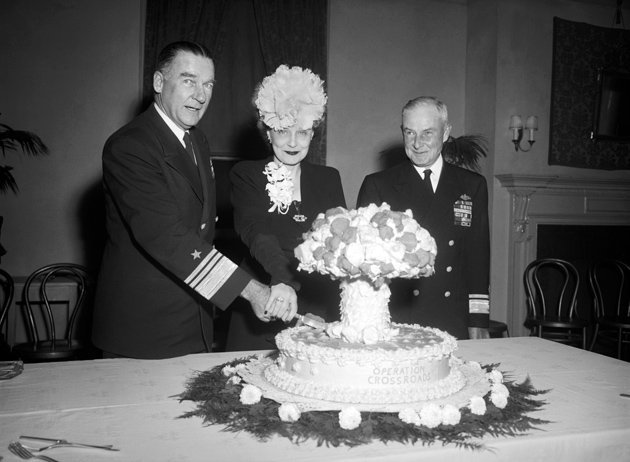
In 1986, the U.S. and Marshall Islands concluded negotiations on a treaty known as the Compact of Free Association. The treaty established the Marshall Islands as an independent nation, while simultaneously securing its position within the U.S. empire. As President Reagan put it at the time, “you’ll always be family to us.”
Under the Compact, the U.S. maintains military control over the Marshall Islands, which serves as an outpost of American supremacy in the geopolitically important Pacific region. In return, Marshallese citizens may travel to and remain in the U.S. as “non-immigrant residents,” for the chance to pursue the mythic “American Dream”: jobs, education, and healthcare not available in the islands.
When the Compact was negotiated, all parties understood that Marshallese would be eligible for public health programs, including Medicare and Medicaid. This was a critical point for negotiators, given heavy disease burdens and inadequate healthcare in the islands.
Marshallese enjoyed access to federal health programs for about ten years. Then, in 1996, federal welfare reform stripped them of eligibility. These members of the “American family” are now the only class of legal residents in the country ineligible for federal public health insurance.
Tens of thousands of Marshallese live in the United States. Most work low-income jobs and cannot afford private health insurance. Lack of affordable insurance means lack of access to urgently needed healthcare, only exacerbating the gross health injustices caused by U.S. imperialism in their homeland.
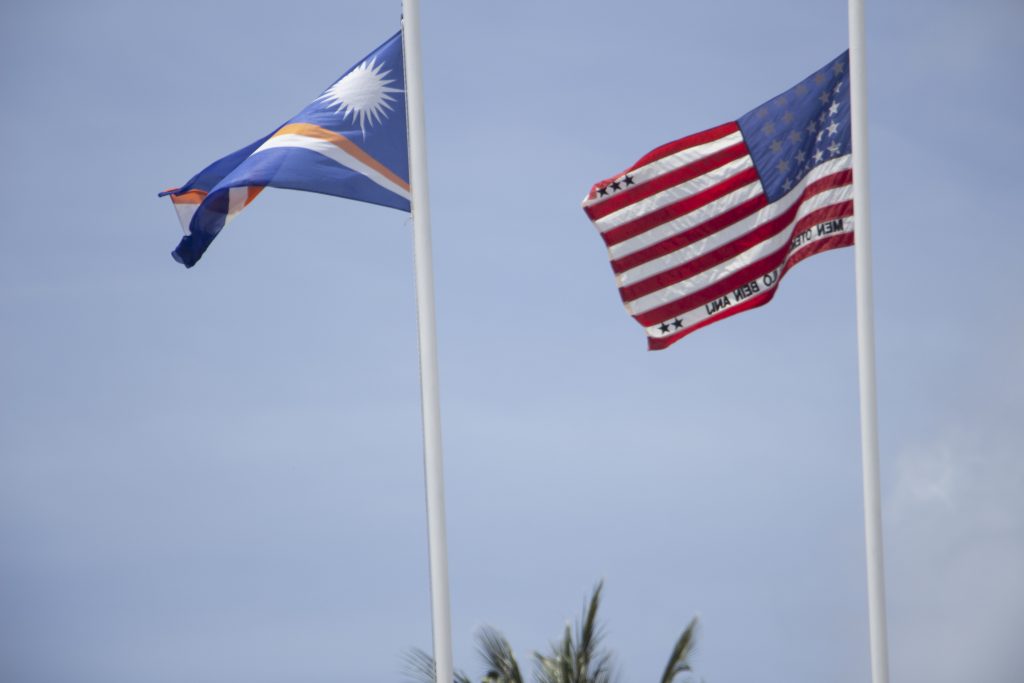
U.S. Abuses Leave Marshallese Exceptionally Vulnerable to COVID-19
With the onset of the COVID-19 pandemic, this already dangerous situation has taken a deadly turn. The Marshall Islands proactively closed its borders at the pandemic’s onset and is among the few countries with no positive COVID-19 cases. However, as the U.S. struggles to contain the virus, Marshallese living here are dying at alarming rates—at least 4.5 times higher than the rest of the nation (and twelve times higher than white people).
Pre-existing health conditions increase Marshallese vulnerability to the virus, while high uninsured rates impede access to necessary treatment. Moreover, many Marshallese work in meatpacking plants—now COVID-19 epicenters—doing the “essential” work of keeping Americans fed (while their wages are taxed to support health programs they are ineligible for). Across the country, non-immigrant residents are recruited for such positions because they have all the attributes of illegal immigrants without the risk of deportation.
The vulnerability of this population is not innate or immutable. Rather, it is the byproduct of decades of systemic imperial violence. And that violence continues.
Marshallese have been forced to be exceptionally proactive in responding to the pandemic—launching outreach campaigns and social services to support their communities, whom public health responses have largely failed. Because Islander populations are so small, some say, the impact of public health interventions wouldn’t be worth the effort.
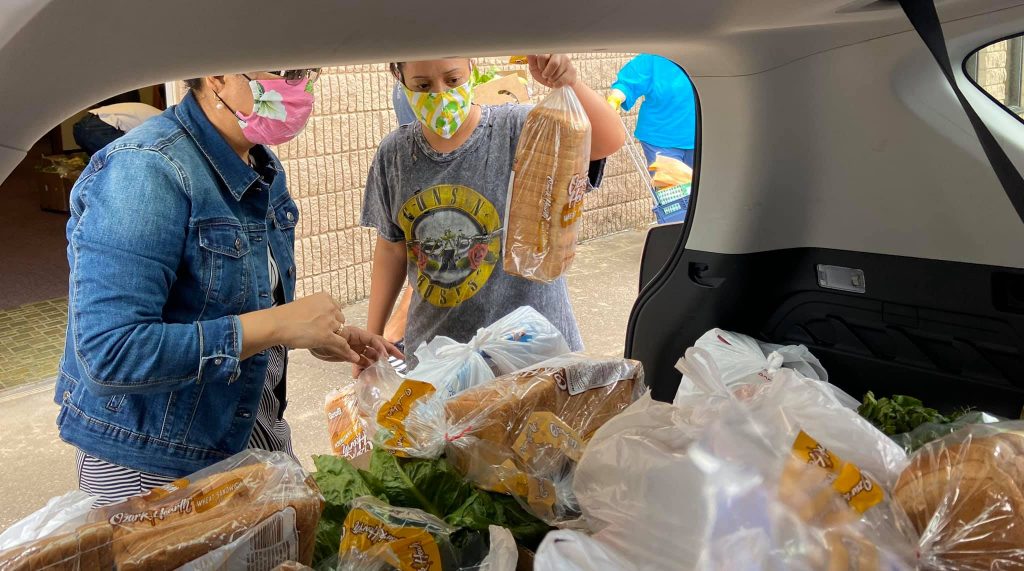
U.S. Abuses Leave Marshallese Exceptionally Vulnerable to Climate Change
As Marshallese communities in the United States are fighting to survive COVID-19, their low-lying nation is fighting to survive the impacts of climate change. And, as in the case of the coronavirus crisis, the Marshall Islands’ vulnerability to the climate crisis cannot be divorced from U.S. imperialism.
The U.S. nuclear testing program in the Marshall Islands contaminated higher elevation and better protected atolls that had been home to Marshallese communities for thousands of years. Today, some displaced populations remain in exile on tiny islands that the Marshallese have always considered uninhabitable. Others live next to a leaking nuclear waste repository that is steadily submerging as sea levels rise.
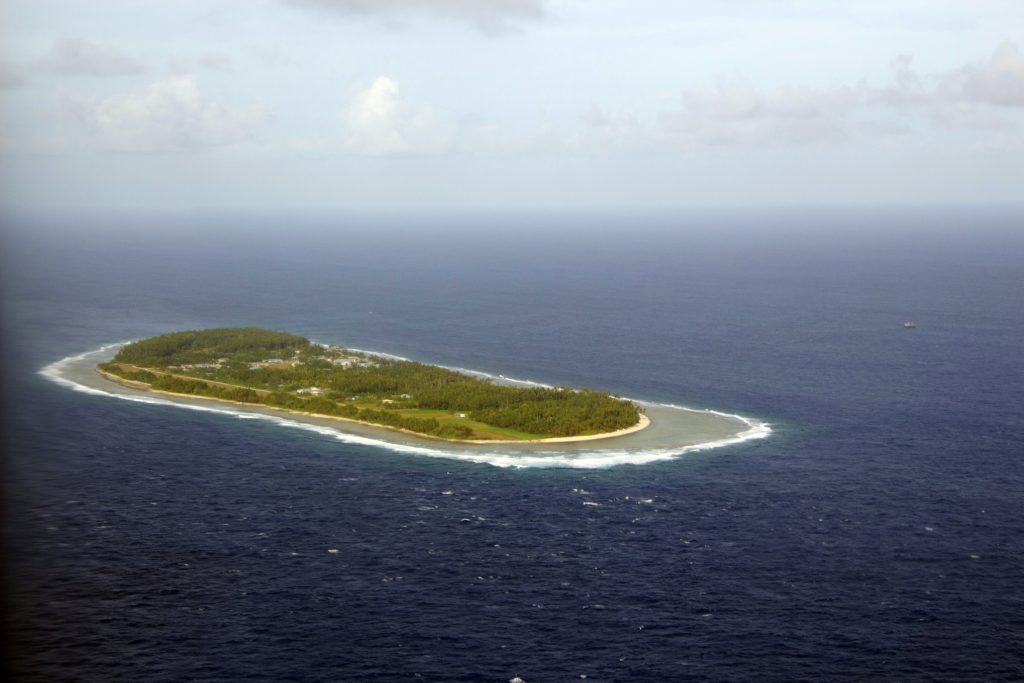
Without aggressive adaptation, the entire nation is anticipated to be underwater by mid-century. While engineering solutions exist that could save the Marshall Islands, decades of entrenched dependency and uncompensated nuclear harms have left the Marshallese without the resources or capacity to independently adapt. To date, outside funders have been unwilling to support the types of projects that could help the country survive. As the Marshall Islands’ former National Climate Advisor, Ben Graham, explains: “There are those who say, you know what, your population is too small to spend half a billion dollars on it. Just relocate. It’s not worth keeping your culture and your sovereign status.”
Meanwhile, the U.S. and other global powers continue to devour fossil fuels, worsening climate impacts and rendering adaptation ever more difficult and expensive. (By the way, the U.S. military is estimated to be the single largest global carbon emitter.)
Once again, Marshallese have been deemed disposable.
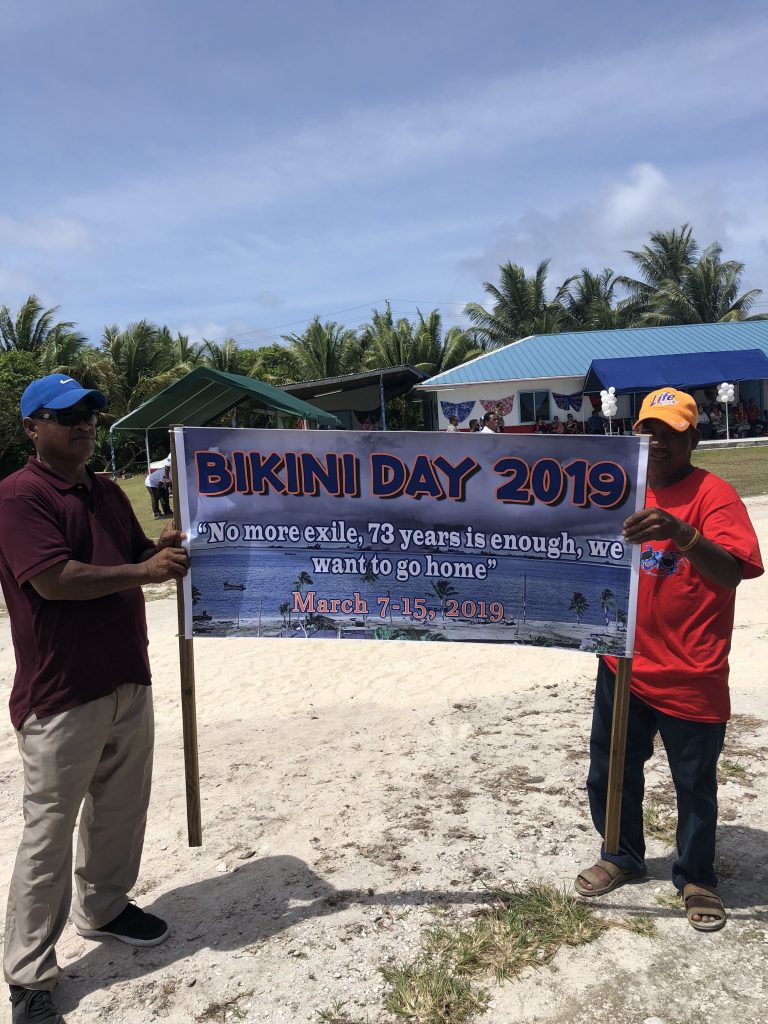
Of course, it’s not just Marshallese.
Oppressed peoples throughout the U.S. empire have been left exceptionally vulnerable, as both the coronavirus crisis and climate crisis make clear. For example, non-immigrant residents from the other freely associated states, Palau and the Federated States of Micronesia, face many of the same challenges as the Marshallese. In the U.S. territory of Guam, military might takes precedence over keeping local people safe from the pandemic and from the impacts of climate change—all in the name of national security. And throughout Indian country, a history of dispossession and diminishment dating back to this country’s founding, coupled with ongoing assaults on tribal sovereignty, have created deadly COVID-19 hotspots. The same factors have left Native nations highly vulnerable to climate change.
Though the struggles of oppressed groups are different—be it for sovereignty or civil rights, an end to state-sanctioned murder or an end to death by militarization—the methods of oppression are remarkably similar. In the words of Cornel West, “Black Lives Matter and the fight against US empire are one and the same.” It is the fight for people over profit. For justice over power. For life over death.
Now, more than ever, it is time to join that fight by acknowledging the hypocrisy that props up our nation’s empire. It is time to accept these truths, which are becoming increasingly self-evident: that there is no cohesive “American family”; that America has never embodied ideals of equality under the law or liberty and justice for all; and that the American project is and always has been to aggregate wealth and power for those who already have it.
It’s time to show what being a family really means.
Some immediate steps you can take:
- Support Marshallese COVID-19 response efforts in Arkansas, by donating here: https://gf.me/u/x5nvux
- Help to restore Medicaid for non-immigrant residents by calling your Congressional representative and urging them to include two bills that have been (repeatedly) introduced to Congress—H.R. 4821 and S. 2218—in the next COVID-19 relief package.
Reader Comments
2 Replies to “The “American family” in crisis: Colonialism, COVID-19 risk, and climate vulnerability”
Comments are closed.




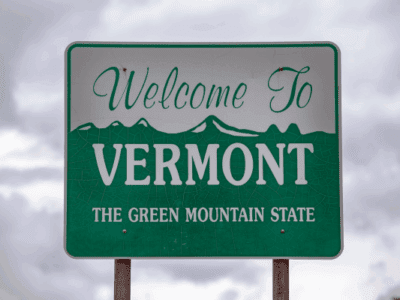
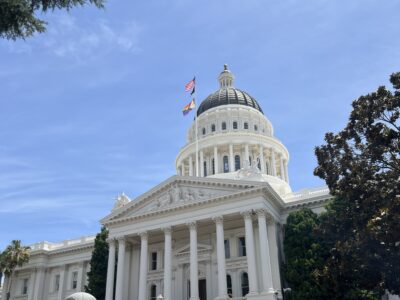

In 1855, Lincoln wrote: “Our progress in degeneracy appears to me to be pretty rapid. As a nation, we began by declaring that “all men are created equal.” We now practically read it “all men are created equal, except negroes” When the Know-Nothings get control, it will read “all men are created equal, except negroes, and foreigners, and Catholics.” When it comes to this I should prefer emigrating to some country where they make no pretence of loving liberty — to Russia, for instance, where despotism can be taken pure, and without the base alloy of hypocracy [sic].” http://www.abrahamlincolnonline.org/lincoln/speeches/speed.htm
Autumn,
Thank you for this devastating and incredibly informative post. I am embarrassed to say that despite having lived in the South Pacific and being an antinuclear activist, much of this story was unknown to me. I am so grateful you are shining some light on this situation, and identifying ways to be help. Your map is also fantastic and I will remember that you have cartographic skills when we need then!
– Claudia